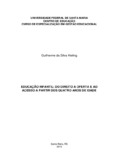| dc.contributor.advisor | Dalla Corte, Marilene Gabriel | |
| dc.creator | Kieling, Guilherme da Silva | |
| dc.date.accessioned | 2017-11-09T14:35:26Z | |
| dc.date.available | 2017-11-09T14:35:26Z | |
| dc.date.issued | 2016-02-23 | |
| dc.date.submitted | 2016 | |
| dc.identifier.uri | http://repositorio.ufsm.br/handle/1/12015 | |
| dc.description | Monografia (especialização) - Universidade Federal de Santa Maria, Centro de Educação, Curso de Especialização em Gestão Educacional, RS, 2016. | por |
| dc.description.abstract | This work was carried out with the support of the Observatory Program of Education (OBEDUC / ELOS), from Higher Education Personnel Improvement Coordination - CAPES / Brazil and it presents limits and possibilities related to the implementation of the Law nº. 12,796 of April 04th , 2013. It has as objective to identify policies related to the right, the offer and the access of Early Childhood Education in Brazil, as well as the enrollment indicators by the Constitutional Amendment 59/2009 and law nº. 12.796 / 2013. This research is guided methodologically by the quantitative and qualitative approach, using quantitative data from INEP and theoretical basis, through legal documents and references, including: Bordignon (2009), Libâneo (2005), the Constitution of 1988, law of Guidelines and Bases of National Education nº. 9394 / 1996 National Education Plan 2014-2024, law nº. 12,796 of 2013, CNE nº. 09 of 2009 and Resolution nº. CMESM 30, 2011, among others. It was concluded that the Basic Education had over the years, very different figures for the initial enrollment, however maintained its average enrollment. In overall numbers, in the midst of Basic Education, Early Childhood Education also remained with an average between the years studied, but its effective obtained a growing larger in relation to the other stages of Basic Education. This is due to the concern in expanding the offerings in the number of vacancies, in addition to incentives and municipalization of early childhood education by the Federal Government. In the legal documents, it is regulated and it is the State duty to ensure the provision of public and free early childhood education without selection requirement, however, the specific competence of the municipality is to manage the first stage of basic education regarding the offer and responsibilities. In this perspective, the vacancies in early childhood education and pre-schools should be offered in institutions close to the children’s homes, which is the case of the right to access, not only just the government offer vacancies; must qualify this offer by the conditions of the access, including location of the schools, good infrastructure, good physical, material and human resources, among other things as necessary and important for Early Childhood Education. | eng |
| dc.language | por | por |
| dc.publisher | Universidade Federal de Santa Maria | por |
| dc.rights | Acesso Aberto | por |
| dc.rights | Attribution-NonCommercial-NoDerivatives 4.0 International | * |
| dc.rights.uri | http://creativecommons.org/licenses/by-nc-nd/4.0/ | * |
| dc.subject | Educação infantil | por |
| dc.subject | Políticas públicas | por |
| dc.subject | Sistema municipal de ensino | por |
| dc.title | Educação infantil: do direito a oferta e ao acesso partir dos quatro anos de idade | por |
| dc.title.alternative | Early childhood education: the right to offer and access from the four year old | eng |
| dc.type | Trabalho de Conclusão de Curso de Especialização | por |
| dc.degree.local | Santa Maria, RS, Brasil. | por |
| dc.degree.specialization | Gestão Educacional | por |
| dc.description.resumo | Este trabalho foi realizado com apoio do Programa Observatório da Educação (OBEDUC/ELOS), da Coordenação de Aperfeiçoamento de Pessoal de Nível Superior – CAPES/Brasil e apresenta limites e possibilidades relacionados à implementação da Lei nº 12.796 de 04 de abril de 2013. Tem como objetivo identificar as políticas relacionadas ao direito, a oferta e ao acesso da Educação Infantil no Brasil, assim como os indicadores de matrícula demandados pela Emenda Constitucional 59/2009 e pela Lei nº 12.796/2013. Esta pesquisa está pautada metodologicamente na abordagem quanti-qualitativa, utilizando-se de dados quantitativos do INEP e embasamento teórico, por meio de documentos legais e referências bibliográficas, entre eles: Bordignon (2009), Libâneo (2005), Constituição Federal de 1988, Lei de Diretrizes e Bases da Educação Nacional nº 9.394 de 1996, Plano Nacional de Educação 2014 – 2024, Lei nº 12.796 de 2013, Resolução CNE nº 09 de 2009 e Resolução CMESM nº 30 de 2011, entre outros. Concluímos que a Educação Básica teve, com o passar dos anos, números muito variados em relação as matrículas iniciais, com suas baixas e altas, entretanto manteve sua média de matrículas. Em números gerais, no bojo da Educação Básica, a Educação Infantil também se manteve com uma média entre os anos pesquisados, mas seu efetivo obteve uma crescente maior em relação as outras etapas da Educação Básica. Isto se deve pela preocupação na ampliação das ofertas no número de vagas, além dos incentivos e municipalização da Educação Infantil pelo Governo Federal. Nos documentos legais está regulamentado que é dever do Estado garantir a oferta de Educação Infantil pública, gratuita e de qualidade sem requisito de seleção, entretanto é competência específica do município a gestão da primeira etapa da Educação Básica no que diz respeito a oferta e respectivas responsabilidades. Nessa perspectiva, as vagas em creches e pré-escolas devem ser oferecidas em instituições próximas às residências das crianças, o que é o caso do direito ao acesso, ou seja, não basta apenas o poder púbico ofertar vagas; tem de qualificar esta oferta pelas condições de acesso, entre elas, localização das escolas, boa infraestrutura, bons recursos físicos, materiais e humanos, entre outros aspectos tão necessários e importantes à Educação Infantil. | por |
| dc.publisher.country | Brasil | por |
| dc.publisher.initials | UFSM | por |
| dc.subject.cnpq | CNPQ::CIENCIAS HUMANAS::EDUCACAO | por |
| dc.publisher.unidade | Centro de Educação | por |



